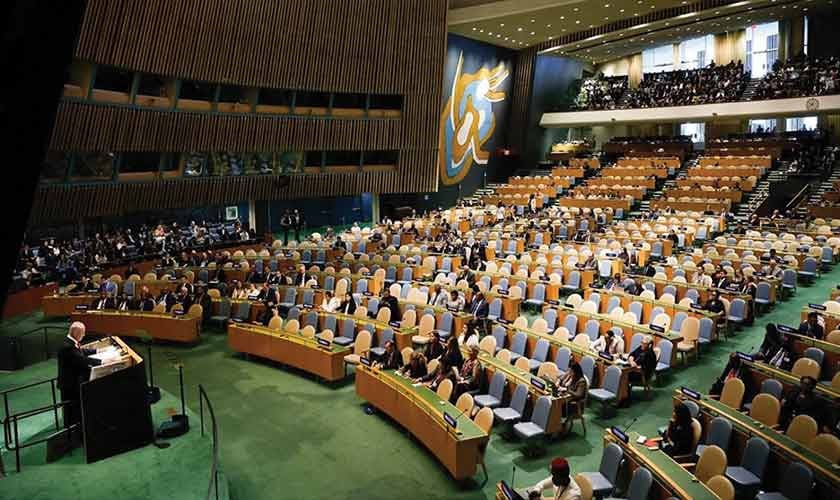The United Nations 80th General Assembly was expected to be a platform to discuss the future of peace in the age of artificial intelligence. Unfortunately, it became one of the most divisive sessions in recent memory, dominated by the issue of Palestine rather than Israel.
The gathering demonstrated that Palestine cannot simply be dismissed as an idea, even with the backing of a global power. Few member states were eager to listen to Israeli Prime Minister Benjamin Netanyahu during his address at the UN General Assembly in New York on September 26, particularly because of his focus on Hamas—the enemy he has relentlessly targeted over the past two years.
Despite a boycott of his speech, Netanyahu attempted to address Hamas directly. However, the session was marked by an almost empty United Nations General Assembly Hall after diplomats from Arab and Muslim countries, along with representatives from several African and some European nations, staged a walkout. Western media described the boycotters as only numbering in the dozens, but their absence was clearly felt.
In his speech, Netanyahu claimed that Israeli intelligence had hacked cell phones across Gaza to play his address. Yet, he offered nothing new to the international community or Hamas, simply reiterating his longstanding demand for the immediate release of the remaining hostages.
Israel boasts some of the world’s most advanced military technology and enjoys full backing from the even more powerful United States. We have witnessed some of their tactical gimmicks, such as exploding pagers. Yet, despite this military muscle and technological edge, they have failed to secure the release of the remaining hostages or achieve the ambitious goal of eliminating Hamas.
According to Netanyahu, of the 48 hostages left in Gaza, 20 may still be alive. Despite intense focus on a mere 41-kilometre stretch of land over the last two years—with high-tech drones and well-armed ground forces—Netanyahu’s government has not managed to bring the hostages home. He vowed he would not rest until all hostages are released.
During his speech, Netanyahu wore a large white badge on his lapel featuring a QR code. He encouraged attendees to scan it, which directed users to a website about the Hamas attacks on October 7, 2023. This move appeared intended to emphasize his commitment to a mission he set nearly two years ago. However, the world remains confused about his ultimate objective: is it the eradication of Hamas, the killing of all Palestinians, or the creation of a Greater Israel?
The theatrics continued in New York. Netanyahu’s office launched a public diplomacy campaign in the city, displaying billboards and trucks with the message “Remember October 7” in Times Square and around the UN building.
A Pew Research Center report from April 2025 highlighted a significant drop in American support for Israel since the Gaza war began. Despite Netanyahu’s efforts, he appeared increasingly isolated on the world stage. His inflexible policies have alienated some former allies, pushing a growing number of Western countries toward recognizing Palestinian statehood. The United Kingdom, Canada, Australia, Portugal, and France are among those that have recently taken this step—much to Netanyahu’s displeasure.
Just days before his UN appearance, on September 12, a vote was held in the UN General Assembly. Out of 193 member states, 142 voted in favor of a declaration on the peaceful settlement of the question of Palestine and the implementation of a two-state solution with Israel. This New York Declaration resulted from an international conference held in July at UN Headquarters, organized by France and Saudi Arabia.
Ten nations opposed the declaration, including Israel and the United States. The other eight opposing countries were Argentina, Hungary, Micronesia, Nauru, Palau, Papua New Guinea, Paraguay, and Tonga. Twelve nations abstained from the vote altogether.
This voting outcome starkly illustrates the shrinking support Tel Aviv now faces. Netanyahu’s diminishing standing is not just a diplomatic issue—it also reflects a deeper shift in American public opinion. The April 2025 Pew report showed that only 54 percent of Americans now consider the Israeli-Palestinian conflict relevant to them, down from 65 percent in January 2024. Likewise, those who view the war as significant to U.S. national interests declined from 75 percent to 66 percent over the same period.
Signs of fatigue are emerging even among Israel’s staunchest ally. Former President Donald Trump has declared that any attempt by Israel to annex parts of the West Bank would be a red line for him.
Despite these signals from Western nations, Netanyahu has yet to grasp the message behind the growing international recognition of Palestinian statehood: the world has had enough. Israel cannot maintain an indefinite license to kill, and limits have been crossed.
Netanyahu’s speech—filled with spin and allegations of anti-Semitism—failed to resonate with many. He now stands increasingly isolated. The sooner he acknowledges this reality, the better it will be for him and for world peace.
According to Gaza’s Health Ministry, more than 65,000 Palestinians have been killed since October 7, 2023. The pressing question remains: how much more bloodshed is needed?
Most concerning of all, Netanyahu’s speech lacked a clear roadmap for peace. For those who hope for a cessation of violence and a return to dialogue, this absence is deeply alarming.
https://www.thenews.com.pk/tns/detail/1348318-no-method-to-netanyahus-madness


